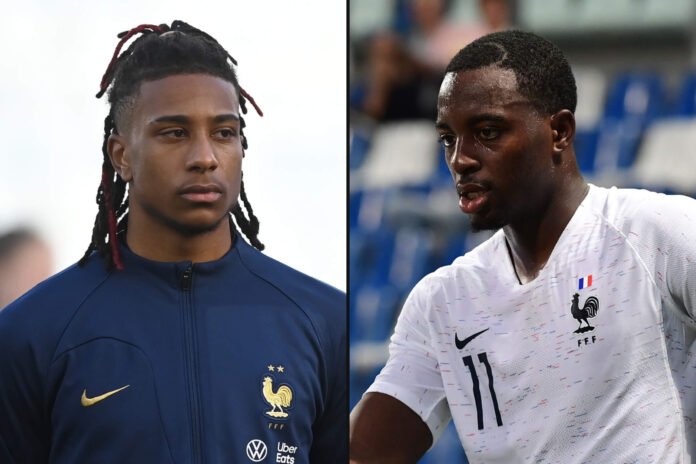The inclusions of Jean-Philippe Mateta and Michael Olise in the initial France squad for the men’s football tournament at the Olympic Games is another summer 2024 boost for Crystal Palace.
Coach Thierry Henry’s 25-man selection is a preliminary one, which must be cut to 18 before the tournament begins at the end of next month. Striker Mateta, at 26, would be one of a maximum of three over-age players allowed in what is essentially an under-23s competition, with Henry naming two in this initial party (former Arsenal forward Alexandre Lacazette, 33, is the other).
The call-ups for Mateta and Olise are not entirely positive from Palace’s perspective, but the pluses outweigh any negatives.
Making the final squad would enable both to develop by spending time alongside some of Europe’s most exciting young talents. Both should feel a sense of pride at playing at an Olympics on home soil and see this as an important step towards full senior international honours, with both having already represented France Under-21s.
It does, though, mean Palace will face some disruption.
The 16-team men’s Olympic football tournament runs from July 24 to the final on Friday, August 9. The new Premier League season begins a week later. So, should Olise and Mateta make the final squad and then France (as they will expect to) progress deep into the knockout phase, both players will be absent for the majority of Palace’s pre-season. They would also almost certainly then be afforded time off after the Olympics before returning to club duties.
Olise, therefore, would miss a Palace pre-season for a third consecutive year. He arrived from previous club Reading in July 2021 with a back problem which delayed his debut until the September, in 2022-23 he was managing a foot injury all summer and in June last year he sustained a hamstring injury on international duty with France at the European Under-21 Championship, and was out for four months.
“On the one hand, I would smile because we always want the best for our players,” Palace manager Oliver Glasner said when asked about players being on international duty this summer, when there is also the European Championship and its South American equivalent, the Copa America, both running to the middle of July.
Oliver Glasner knows Michael Olise’s worth to Palace (Alex Pantling/Getty Images)
“That they can play such a tournament is great for them personally, but for the manager’s heart it is bleeding, because we want our players. With the Euros and the Copa America, we have players not available for at least the first three, maybe four weeks of pre-season, but you can ask all the clubs; they all have the same issue. We have to give the players a rest whenever it is.”
Palace will desperately hope Olise, in particular, comes through the Olympics unscathed if he makes France’s final 18, and while it is not optimal that he would miss their preparation for 2024-25, the positive is that he will return to his club with match sharpness gained during that competition that he would not have received from playing friendlies in pre-season. He will also miss their two-match trip to the U.S. which, although it will involve intensive fitness work, appears to be more beneficial from a commercial perspective than a footballing one.
Olise and Mateta won’t get to work with any new arrivals at Palace if they are on Olympics duty, but they are already well-versed in Glasner’s style of play and system following his appointment in February. Mateta’s 13 goals in 13 games under the Austrian to finish the season earned him the club’s player of the year award and Olise’s contribution was just as crucial in helping Palace finish in the top half of the table, thanks to six wins in their final seven matches.
Were a new manager to have arrived this summer bringing new tactics with him it might be different, but Glasner is unlikely to make huge changes from what we saw on the run-in last season.
Both Olise and Mateta are in demand as transfer targets this summer but their futures are unlikely to be affected by the Olympics, given the clubs keen to sign them are obviously already aware of their abilities. Suitors will not be deterred by the possibility of being without them for the start of the domestic season.
From Palace’s perspective, this is another positive reflection on their recruitment and Glasner’s coaching. Even if the Olympic football competition is a lesser tournament than the European Championship or Copa America, it nevertheless represents international recognition, so it underlines that playing well for Palace offers a platform to achieve something even bigger. That can only help when seeking to sign young talents in particular, and act as a significant selling point for the club.

Jean-Philippe Mateta ended the season in superb form (Alex Davidson/Getty Images)
It could also help in terms of player retention, proving to Olise, Mateta and others that their ambitions can be achieved without needing to move elsewhere. Earning international call-ups also means they should be even more motivated to perform well for their club so they retain that status.
Glasner’s focus on ‘intrinsic motivation’ could ring true here; if Olise and Mateta impress for France this summer, they will know that senior-side honours are within reach as attentions turn to the 2026 World Cup, provided they maintain strong club form.
Whatever the short-term inconveniences, the long-term gains for Palace from this should be tangible.
(Top photos: Getty Images)
Read the full article here


